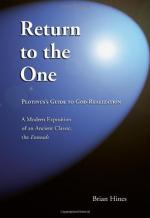|
This section contains 7,152 words (approx. 24 pages at 300 words per page) |

|
SOURCE: “The Human Person,” in Six Lectures on Plotinus and Gnosticism, Kluwer Academic Publishers, 1999, pp. 86-100.
In the following essay, Sinnige examines Plotinus's conception of the nature of individuality.
I.
The problem of being an autonomous person in one's own right is as old as Greek philosophy. In a text by Anaximander, given as a literal quotation by Simplicius (DK 12 B 1), being an individual is described as a rebellion against the Infinite. All things are generated from the Infinite, and, when they are dissolved, are taken up again into the Infinite. It is cosmic law which has ordered this. The generated beings pay penalty to each other for their injustice. The separate existence, maintained by individuals in the face of their divine origin, is seen as a transgression of cosmic laws.
The image and its cosmic landscape is recognizable in Plotinus' doctrine about the fate and condition of...
|
This section contains 7,152 words (approx. 24 pages at 300 words per page) |

|


